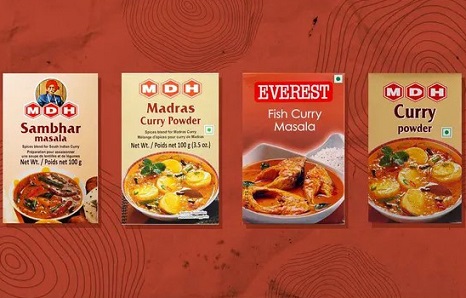Spices Sold Under Indian Brands MDH And Everest Found To Contain Carcinogenic Pesticide Ethylene Oxide And Are Being Banned In Many Countries!
Nikhil Prasad Fact checked by:Thailand Medical News Team Apr 25, 2024 11 months, 3 weeks, 2 days, 3 hours, 11 minutes ago
Health News: The spice industry in India has long been celebrated for its rich flavors and aromatic blends, captivating the taste buds of millions both domestically and internationally. However, recent developments have cast a shadow over two major spice giants, MDH and Everest, as their products face scrutiny and bans in several countries due to the presence of ethylene oxide, a carcinogenic pesticide.
 Spices Sold Under Indian Brands MDH And Everest Found To Contain
Spices Sold Under Indian Brands MDH And Everest Found To Contain
Carcinogenic Pesticide Ethylene Oxide
Ethylene oxide is a compound that has been declared as a carcinogen by the U.S. EPA and various other medical entities in the United States and elsewhere around the world.
https://www.epa.gov/sites/default/files/2016-09/documents/ethylene-oxide.pdf
https://www.cancer.gov/about-cancer/causes-prevention/risk/substances/ethylene-oxide
The Emergence of the Issue
The controversy surfaced when Hong Kong and Singapore took decisive actions by halting the sales of certain MDH and Everest spice products. This move came after concerns were raised regarding elevated levels of ethylene oxide detected in these spice blends, raising alarms about potential health risks associated with long-term consumption.
Hong Kong and Singapore’s Response
In Hong Kong, the Centre for Food Safety (CFS) suspended the sales of three MDH spice blends and an Everest spice mix specifically designed for fish curries. Similarly, Singapore issued a recall for the Everest fish curry masala and advised against its consumption, citing the presence of ethylene oxide beyond permissible limits.
Health News coverages were also disseminated warning consumers to be wary of these spice products.
Indian Regulatory Intervention
In response to these international actions, Indian authorities swiftly stepped in to investigate the matter. The Spices Board of India, responsible for maintaining quality standards and testing protocols, initiated thorough inspections of MDH and Everest facilities. The companies were called upon to provide comprehensive details regarding their quality assurance processes and adherence to regulatory standards.
Company Responses and Denials
Both MDH and Everest, pillars of the Indian spice market, faced intense scrutiny and public concern. While an executive vice-president for MDH refrained from commenting, Everest defended its products' safety, asserting that they undergo rigorous testing and receive necessary clearances from Indian regulatory bodies before export. Everest also refuted claims of complete bans in Singapore and Hong Kong, cl
arifying that only a fraction of its products faced examination in Singapore.
The Impact on Market Dynamics
The repercussions of this controversy extended beyond regulatory actions. India's spice export industry, valued at billions of dollars, faced potential setbacks as consumer confidence wavered amid safety concerns. The association of Bollywood stars with Everest added a layer of complexity, as public trust in celebrity-endorsed brands came under scrutiny.
Ethylene Oxide: A Persistent Concern
The detection of ethylene oxide in these spice products reignited discussions about pesticide regulations and their enforcement. Ethylene oxide, classified as a carcinogen by health authorities, poses significant health risks with prolonged exposure. Its presence in food products, especially in levels exceeding safety thresholds, raises serious public health concerns and underscores the importance of stringent quality control measures.
Recalls and Previous Incidents
This is not the first time Everest faced scrutiny over its products. In June 2023, the U.S. Food and Drug Administration issued a recall for two Everest spice blends due to Salmonella contamination, highlighting recurrent challenges in maintaining food safety standards. These incidents underscore the need for continuous monitoring and regulatory oversight across the spice industry.
Global Implications and Collaborative Efforts
The international response to the ethylene oxide contamination in Indian spices reflects a broader trend of global cooperation in addressing food safety challenges. Collaborative efforts between countries and regulatory agencies are essential in mitigating risks associated with contaminated food products, ensuring consumer safety on a global scale.
The Role of Media and Public Awareness
The media played a pivotal role in amplifying awareness about the ethylene oxide contamination issue. Through comprehensive coverage and investigative reporting, media outlets shed light on the complexities of food safety regulations, corporate accountability, and consumer rights. Public awareness and informed decision-making are crucial in driving industry accountability and fostering a culture of transparency.
Lessons Learned and Future Directions
The MDH and Everest spice controversy serves as a critical learning opportunity for stakeholders across the food industry spectrum. It underscores the importance of robust quality control measures, transparent supply chains, and proactive regulatory interventions. Moving forward, collaborative efforts between government agencies, industry players, and consumer advocates are imperative to uphold food safety standards and restore public trust in Indian spice exports.
Conclusion
The revelation of ethylene oxide contamination in MDH and Everest spice products has sent shockwaves through the global spice market and raised urgent questions about food safety and regulatory compliance. While investigations and regulatory actions are underway, the incident serves as a stark reminder of the multifaceted challenges facing the food industry. It underscores the need for continuous vigilance, transparency, and collaboration to ensure that consumers can confidently enjoy the flavors of Indian spices without compromising their health and well-being
For the latest
Health News, keep on logging to Thailand Medical News.
